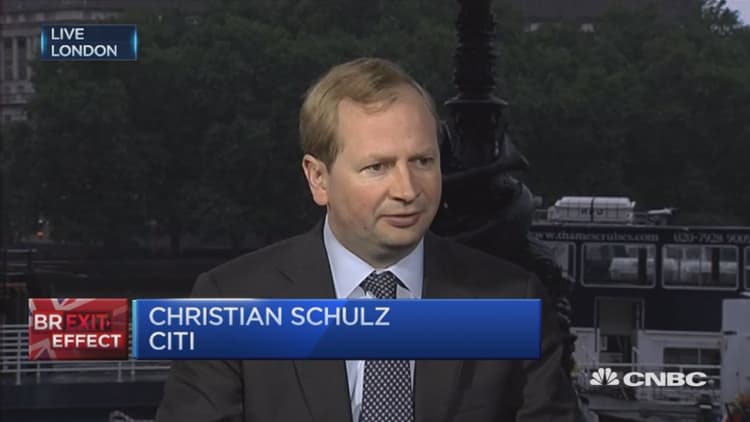



Sterling and European stock indexes fell further on Monday, with the outlook for the region unclear after the U.K. voted to quit the European Union (EU) last week.
Moody's Investors Service late Friday cut its outlook on U.K. sovereign debt from stable to negative, indicating a higher likelihood of the agency downgrading the country's Aa1 rating.
The U.K. referendum result, which rocked global markets on Friday, is "extremely significant for the U.K. and significant for the rest of Europe," Alastair Wilson, the head of sovereign ratings at Moody's told CNBC on Sunday.
"Our rating is Aa1 and it remains Aa1, but the negative outlook reflects the fact that this is bad for growth, bad for debt and bad for the U.K.'s institutions and their ability to deliver on policy," Wilson said.
"Equally, it is bad for Europe, as well. We do not yet know quite how bad; we will see that as we see elections coming," he added.
On Monday, sterling traded more than 2 percent lower on the day against the U.S. dollar at around $1.329 — a smidgen above Friday's 30-year low of $1.3224.
The euro traded lower against the dollar on Monday, at around $1.104.
"Sterling has fallen and correctly so, but it is not gapping … it is (a) pretty orderly (decline), but nasty," David Bloom, head of foreign exchange research at HSBC, told CNBC on Monday.
European stock markets
European markets
Moody's base case is for the U.K. to strike an agreement with the EU that allows it current free-trade arrangements with the bloc to continue, Wilson said.
"If it does not, we expect to see a reasonably significant short-term economic shock, but if it does, then the growth will come back," he told CNBC.
Wilson forecast the U.K. economy would grow by around 1.5 percent this year and close to 1 percent in 2017. This is contrast to Goldman Sachs, which warned the U.K. was likely to enter recession by early next year on Sunday.
"We are not looking at a recession," Wilson said. "But what we will see, if the U.K. is not able to agree the kind of trading arrangements that it currently benefits from in the EU, is sustained and materially lower growth over the medium-term."
In a sign of further possible disruption in Europe, Wilson pointed to Spain, which went to the polls over the weekend. The conservative People's Party won the most votes in the parliamentary election, but was short of a majority, according to media reports.
"We have got forthcoming elections over the coming months and years in some of the major European states; we have got budgets to be agreed and we will see just how far this pushes incumbent parties away from their plans to consolidate their debt," he said.

